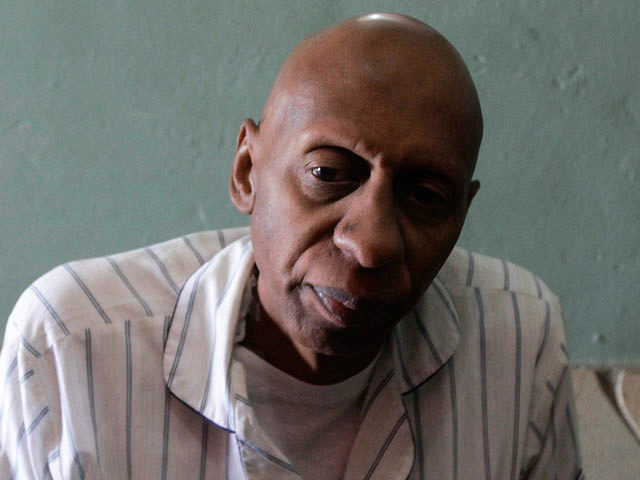World-renowned Cuban dissident activist Guillermo Fariñas began his 46th day on his 24th hunger strike Monday, a strike he has said he will end only when dictator Raúl Castro agrees to an end to the use of state violence against political dissidents.
As Fariñas’s hunger strike continues and his health deteriorates ever more rapidly, international pressure on Fariñas to end the hunger strike before he dies has grown, while few have demanded Castro’s communist government abandon the use of beatings and torture in Cuba to keep those who do not believe in the Revolution silent. The latter would save Fariñas’ life and, potentially, the lives of hundreds of other dissidents who are threatened by state violence regularly for their rejection of communism.
Fariñas made clear on the first day of his hunger strike that he would not eat or drink water until “Raúl Castro says publicly to everyone that there will be no more torture, no more beatings, no more death threats, no more false charges against opposition and arbitrary confiscation.”
As the protest approaches a month and a half — a much more damaging amount of time for Fariñas, who suffers from chronic medical problems related to his other 32 hunger strikes, than someone who has never engaged in the practice — fellow dissidents have lost hope that Castro will listen to Fariñas and are calling for him to choose to end his own protest.
“We are your brothers in this struggle, we want the same thing you are demanding, but we need you alive so that you may continue this path with us until we reach liberty,” a group of twelve dissidents write in an open letter to Fariñas released this week. “You know well your life is in danger and it is necessary for you to step down from your position immediately,” the dissidents request.
In an interview with the Miami-based Martí Noticias, Fariñas confirmed that he believes “the Cuban government has already given the order to let me die” and that he does not believe Castro will accede to his demand to end the use of violence.
Among those signing the letter urging Fariñas to end his strike are some of the Cuba’s most vocal opponents, civil society leaders who have faced beatings and arbitrary arrests on a weekly basis: Berta Soler of the Ladies in White group, José Daniel Ferrer of the Cuban Patriotic Union (UNPACU), and Martha Beatriz Roque, among others.
In Florida, Cuban American National Foundation President Jose Hernandez is also calling for Fariñas to consider his health and end his strike. “The Castro regime will not cede, will not change its oppressive ways, because Guillermo is risking his life,” Hernandez told Fox News Latino. “I told him that he’s gotten his point across to the world, the world knows his demands and human rights activists, thought leaders and political leaders have responded and showed support.”
While dissidents have little reason to hope that their demands to save Fariñas’s life by agreeing to international human rights norms will be met, they are not alone in pressuring Fariñas to end his strike. Among the first publicly known calls Fariñas received to end his strike came from the U.S. government. Last week, Fariñas confirmed that a U.S. envoy visited him. “He told me that at the time he was the one in charge of the embassy because [U.S. Ambassador to Cuba Jeffrey] DeLaurentis was not in, and that he had had direct conversations with the president of the United States and the Secretary of State,” Fariñas said, and he confirmed that he was pressured to end his strike.
Fariñas did not make any mention of that U.S. envoy, Scott Hamilton, informing him that the Obama administration would use its newly-acquired political capital with the Cuba Castro regime to urge them to consider Fariñas’s demands. There is no indication the White House has acted to save Fariñas’s life, other than demanding Fariñas turn back on his word.
Fariñas’s organization, the United Antitotalitarian Forum (FANTU), sent a letter to President Obama requesting her personally interfere to begin a dialogue with Havana about respecting human rights, thus ending the hunger strike and saving Fariñas’s life. Other than Hamiton’s visit, there is no indication President Obama has responded to that request.
Fariñas, the 2010 recipient of the European Union’s Andrei Sakharov Prize for Human Rights Advocacy, is considered among the most high-profile and effective dissidents. His hard-line stance against communism has put him at odds with some moderate political elements who claim to be part of the Cuban dissident community, who have celebrated President Barack Obama’s diplomatic efforts to legitimize the Castro regime. Fariñas has said he has felt “betrayed” by President Obama and sees nothing positive coming from opening greater economic opportunities to the Castro dictatorship. For months before his current hunger strike, Fariñas threatened to start another one if the Castro regime continued to use violence to silence critics.
FANTU has also launched a petition demanding Cuba’s Castro listen to Fariñas’s demands.
Fariñas has lost 42 pounds since the protest began, and his health is described as extremely fragile. He suffers chronic pain in his back and intense headaches as a result of dehydration and hunger. He has been hospitalized four times against his will since the protest began, each time checking himself out of the hospital upon regaining consciousness.

COMMENTS
Please let us know if you're having issues with commenting.